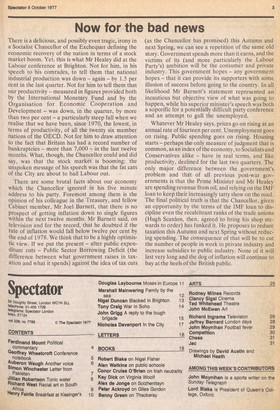Now for the bad news
There is a delicious, and possibly even tragic, irony in a Socialist Chancellor of the Exchequer defining the economic recovery of the nation in terms of a stock market boom. Yet, this is what Mr Healey did at the Labour conference at Brighton. Not for him, in his speech to his comrades, to tell them that national industrial production was down — again — by 1.5 per cent in the last quarter. Not for him to tell them that our productivity — measured in figures provided both by the International Monetary Fund and by the Organisation for Economic Cooperation and Development — was down, in the quarter, by more than two per cent — a particularly steep fall when we realise that we have been, since 1970, the lowest, in terms of productivity, of all the twenty six member nations of the OECD. Not for him to draw attention to the fact that Britain has had a record number of bankruptcies — more than 7,000 7 in the last twelve months. What, though, the Chancellor could and did say, was that the stock market is booming: the unspoken message of his speech was that the fat cats of the City are about to bail Labour out.
There are some brutal facts about our economy which the Chancellor ignored in his five minute address to his party. Foremost among them is the Opinion of his colleague in the Treasury, and fellow Cabinet member, Mr Joel Barnett, that there is no Prospect of getting inflation down to single figures within the next twelve months. Mr Barnett said, on television and for the record, that he doubted if the rate of inflation would fall below twelve per cent by the end of 1978. We think that to be a highly optimistic view. If we put the present — after public expenditure cuts — Public Sector Borrowing Deficit (the difference between what government raises in taxation and what it spends) against the idea of tax cuts
(as the Chancellor has promised) this Autumn and next Spring, we can see a repetition of the same old story. Government spends more than it earns, and the victims of its (and more particularly the Labour Party's) ambition will be the consumer and private industry. This government hopes — any government hopes — that it can provide its supporters with some illusion of success before going to the country. In all likelihood Mr Barnett's statement represented an incautious but objective view of what was going to happen, while his superior minister's speech was both a soporific for a potentially difficult party conference and an attempt to gull the unemployed.
Whatever Mr Healey says, prices go on rising at an annual rate of fourteen percent. Unemployment goes on rising. Public spending goes on rising. Housing starts — perhaps the only measure of judgment that is common, as an index of the economy, to Socialists and Conservatives alike — have in real terms, and like productivity, declined for the last two quarters. The only major difference between the government's problem and that of all previous post-war governments is that the Prime Minister and Mr Healey are spending revenue from oil, and relying on the IMF loan to keep their increasingly tatty show on the road. The final political truth is that the Chancellor, given an opportunity by the terms of the IMF loan to discipline even the recalcitrant ranks of the trade unions (Hugh Scanlon, then, agreed to bring his shop stewards to order) has funked it. He proposes to reduce taxation this Autumn and next Spring without reducing spending. The consequence of that will be to cut the number of people in work in private industry and increase subsidies to public industry. None of it will last very long and the dog of inflation will continue to bay at the heels of the British public.


































 Previous page
Previous page